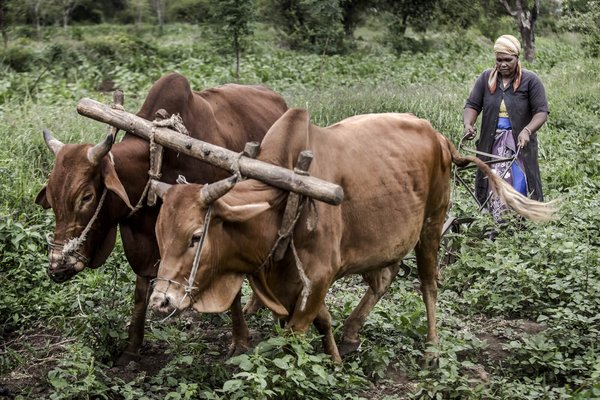- Share this article
- Subscribe to our newsletter
Slow progress in food and agriculture-related SDGs
Four Sustainable Development Goals (SDGs) have been analysed by the Food and Agriculture Organization of the United Nations: SDG 2 – Zero Hunger, SDG – 6 Clean Water and Sanitation, SDG 14 – Life below Water and SDG 15 – Life on Land. The results published in July 2019 are worsening: The world is off-track to meet most of the Sustainable Development Goal (SDG) targets linked to hunger, food security and nutrition.
More than 820 million people are still hungry today. The number of hungry people in the world has been on the rise for three years in a row, and is back to levels seen in 2010-2011. In parallel, the percentage of hungry people out of the total population has slightly increased, from 10.6 per cent in 2015 to 10.8 per cent in 2018.
Small-scale food producers - who represent the majority of all farmers in many developing countries - face disproportionate challenges in accessing inputs and services, and as a result, their incomes and productivity are systematically lower compared to larger food producers. In most countries, their incomes are less than half of those of larger food producers.
More than half of local livestock breeds at risk of extinction
On average, 60 per cent of local livestock breeds are at risk of extinction in the 70 countries that had risk status information. Specifically, across the world, out of 7155 local livestock breeds (i.e. breeds occurring in only one country), 1940 are considered to be at risk of extinction. However, this could be even higher because for two thirds of the local livestock breeds, especially in the Middle and Near East, Africa and Asia, there is no data on the animals' risk status.
FAO warns of "no progress in conserving animal genetic resources and notes that ongoing efforts to preserve these resources appear inadequate". The conservation of plant genetic material is faring somewhat better. Nevertheless, efforts to secure crop diversity continue to be insufficient, cautions the report, particularly for crop wild relatives, wild food plants and neglected and underutilised crop species.
Overfishing and uneven implementation of international instruments for sustainable fisheries of concern
One third of the world's marine fish stocks are overfished today, compared to only 10 per cent in 1974. Despite some recent improvements in fisheries management and stock status in developed countries, the proportion of stocks fished within biologically sustainable levels has decreased significantly in developing countries.
Moreover, some 30 per cent of countries still have a low or medium implementation record of the key international instruments combatting illegal, unreported and unregulated fishing, and some 20 per cent of countries have a low or medium implementation record of the key instruments to promote access of small-scale fishers to productive resources, services and markets.
Declining public investment in agriculture
According to FAO, many of the problems mentioned above would probably be less acute if there was sufficient investment in the agricultural sector (including fishery and forestry). However, public expenditure in agriculture has been declining with respect to its contribution to the Gross Domestic Product (GDP). In particular, the Sub-Saharan African region and Oceania (excluding Australia and New Zealand) registered the lowest relative values of public investment in agriculture.
Recommendations to reverse these worsening trends are:
- Promoting productivity growth and strengthening the resilience and adaptive capacity of small-scale food producers.
- Addressing price anomalies by improving information on prices and on food supply and demand of basic food stuffs, allowing markets to function more efficiently.
- Improving water productivity and irrigation in agriculture and reducing losses in municipal distribution networks, and industrial and energy cooling processes are among the main issues to be tackled when it comes to water stress.
- Finally, all countries need to urgently implement transformational changes in fishery management and governance.
(FAO/ile)
More information: Tracking progress on food and agriculture-related SDG indicators -
A report on the indicators under FAO custodianship:www.fao.org/sdg-progress-report/en/





Add a comment
Be the First to Comment